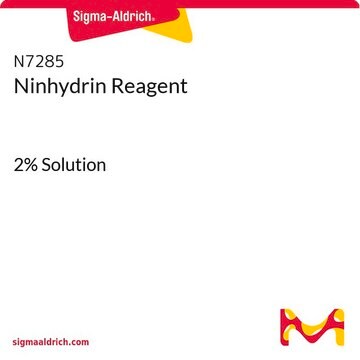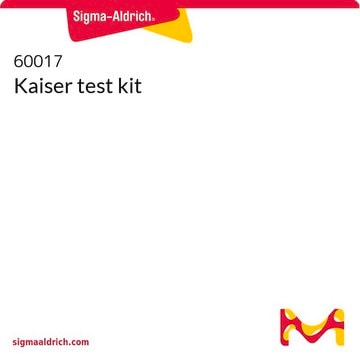1.06762
Ninhydrin
GR for analysis ACS,Reag. Ph Eur
Synonym(s):
Ninhydrin, 2,2-Dihydroxy-1,3-dioxohydrindene, 2,2-Dihydroxy-1,3-indandione, Indantrione hydrate, Triketohydrindene hydrate
About This Item
Recommended Products
grade
ACS reagent
Quality Level
Agency
reag. Ph. Eur.
form
solid
potency
600 mg/kg LD50, oral (Rat)
pH
4.6-5.0 (20 °C, 10 g/L in H2O)
mp
250-258 °C (decomposition)
bulk density
680 kg/m3
storage temp.
15-25°C
InChI
1S/C9H6O4/c10-7-5-3-1-2-4-6(5)8(11)9(7,12)13/h1-4,12-13H
InChI key
FEMOMIGRRWSMCU-UHFFFAOYSA-N
Looking for similar products? Visit Product Comparison Guide
Application
- Development of aminolyzed polylactic acid-based porous films for pH-responsive sustained drug delivery devices: This research highlights the use of Ninhydrin in developing advanced drug delivery systems, particularly in pH-responsive applications for controlled release, emphasizing its role in pharmaceutical innovations (Rafique et al., 2024).
- Crystal structure and solution scattering of Geobacillus stearothermophilus S9 peptidase reveal structural adaptations for carboxypeptidase activity: Ninhydrin is utilized in this study to understand the enzymatic mechanisms and structural adaptations of proteins, contributing significantly to biochemical research and enzyme therapy (Chandravanshi et al., 2024).
- TiO(2)/Ag-based photodeposited catalyst boosted electrochemiluminescence of ninhydrin-hydrogen peroxide system for ultrasensitive sensing of copper (II): Demonstrates the application of Ninhydrin in environmental monitoring, particularly in the detection of metal ions, showcasing its potential in environmental science and analytical chemistry (Xiong et al., 2024).
- Synthesis of aminolyzed gelatin-mediated chitosan as pH-responsive drug-carrying porous scaffolds: Highlights the use of Ninhydrin in biomedical engineering, specifically in the creation of biocompatible scaffolds for tissue engineering and regenerative medicine (Sarwar et al., 2024).
- Periodic and non-periodic DFT studies of an organic semiconductor material: Structural, electronic, optical, and vibrational properties of ninhydrin: This study explores the fundamental properties of Ninhydrin as an organic semiconductor, contributing to the understanding of its electronic and structural characteristics which are crucial for the development of new semiconductor materials (Benaissa et al., 2024).
Analysis Note
Appearance: White to yellow or brownish white crystalline powder or crystals.
Solubility (10 g/l, water): conforms
Melting point: about 250
Suitability for amino acid analysis: conforms
Signal Word
Warning
Hazard Statements
Precautionary Statements
Hazard Classifications
Acute Tox. 4 Oral - Eye Irrit. 2 - Skin Irrit. 2
Storage Class Code
11 - Combustible Solids
WGK
WGK 3
Flash Point(F)
Not applicable
Flash Point(C)
Not applicable
Certificates of Analysis (COA)
Search for Certificates of Analysis (COA) by entering the products Lot/Batch Number. Lot and Batch Numbers can be found on a product’s label following the words ‘Lot’ or ‘Batch’.
Already Own This Product?
Find documentation for the products that you have recently purchased in the Document Library.
Customers Also Viewed
Protocols
Spectrophotometric determination of proline by the Ninhydrin method, per EN 1141 and German Food and Feed Code §64 LFBG 31.00-7.
Spectrophotometric determination of proline by the Ninhydrin method, per EN 1141 and German Food and Feed Code §64 LFBG 31.00-7.
Spectrophotometric determination of proline by the Ninhydrin method, per EN 1141 and German Food and Feed Code §64 LFBG 31.00-7.
Spectrophotometric determination of proline by the Ninhydrin method, per EN 1141 and German Food and Feed Code §64 LFBG 31.00-7.
Our team of scientists has experience in all areas of research including Life Science, Material Science, Chemical Synthesis, Chromatography, Analytical and many others.
Contact Technical Service









